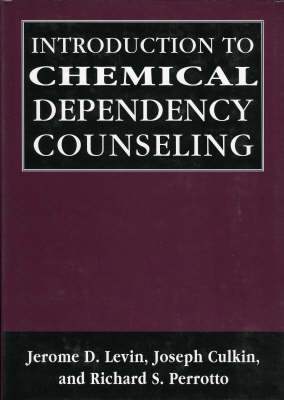
Introduction to Chemical Dependency Counseling
Seiten
2002
Jason Aronson Publishers (Verlag)
978-0-7657-0289-0 (ISBN)
Jason Aronson Publishers (Verlag)
978-0-7657-0289-0 (ISBN)
Covers the scientific and clinical aspects of chemical dependency with case vignettes to illustrate clinical issues. This book offers a set of specific techniques that help clinicians develop into practitioners.
This book is a basic resource of knowledge about alcoholism and drug addiction. The authors cover the scientific and clinical aspects of chemical dependency in a balanced way with case vignettes to illustrate clinical issues. The book is suitable for a number of student needs. Students preparing for the Certified Alcoholism and Substance Abuse Counselor (CASAC) examination will find topics discussed that are drawn from the certification examination requirements. The text can stand as a main source for college-level courses in addictions or chemical dependancy in the mental health health programs, and can be used as a college or stand-alone introduction to chemical dependancy and counseling. Psychologists, social workers, clergy, and other professional counselors who wish to supplement their knowledge about chemical dependancy will find this text serves as a valuable reference. After an introduction to the general problems of substance abuse counseling, the authors delineate the different types of drugs and their effects, organize the relevant information used in the assessment and diagnosis of addictions, integrate knowledge of human development with causes of dependancy and addiction, and explore the impact of addiction on health and the family. They then focus on the principles of chemical abuse counseling, including treatment planning, the different schools of counseling, how to understand and manage relapse, and special populations. They conclude with ethical considerations involved in treating chemical abusers. The authors believe that chemical dependency counseling is the only profession that treats substance abuse as a primary disorder and disease with its own causes, course, progression and complication. Chemical dependency counseling must deal with and absorb a complex and intriguing web of fact and theory drawn from sciences, medicine, and other fields. But the practical side of chemical dependency counseling remains an art and a science. This book offers a whole set of specific techniques
This book is a basic resource of knowledge about alcoholism and drug addiction. The authors cover the scientific and clinical aspects of chemical dependency in a balanced way with case vignettes to illustrate clinical issues. The book is suitable for a number of student needs. Students preparing for the Certified Alcoholism and Substance Abuse Counselor (CASAC) examination will find topics discussed that are drawn from the certification examination requirements. The text can stand as a main source for college-level courses in addictions or chemical dependancy in the mental health health programs, and can be used as a college or stand-alone introduction to chemical dependancy and counseling. Psychologists, social workers, clergy, and other professional counselors who wish to supplement their knowledge about chemical dependancy will find this text serves as a valuable reference. After an introduction to the general problems of substance abuse counseling, the authors delineate the different types of drugs and their effects, organize the relevant information used in the assessment and diagnosis of addictions, integrate knowledge of human development with causes of dependancy and addiction, and explore the impact of addiction on health and the family. They then focus on the principles of chemical abuse counseling, including treatment planning, the different schools of counseling, how to understand and manage relapse, and special populations. They conclude with ethical considerations involved in treating chemical abusers. The authors believe that chemical dependency counseling is the only profession that treats substance abuse as a primary disorder and disease with its own causes, course, progression and complication. Chemical dependency counseling must deal with and absorb a complex and intriguing web of fact and theory drawn from sciences, medicine, and other fields. But the practical side of chemical dependency counseling remains an art and a science. This book offers a whole set of specific techniques
Jerome D. Levin, Ph.D., is director of the Alcoholism and Substance Abuse Counselor Training Program at the New School University in Manhattan, where he also serves both on the humanities department faculty, and as co-director of the joint masters program in psychology and substance abuse treatment. Joseph Culkin, Ph.D., is professor of psychology in the Department of Social Sciences of Queensborough Community College/The City University of New York. Richard S. Perrotto, Ph.D., is professor of psychology in the Department of Social Sciences at Queensborough Community College/The City University of New York, where he has taught since 1978.
| Erscheint lt. Verlag | 1.5.2002 |
|---|---|
| Verlagsort | Northvale NJ |
| Sprache | englisch |
| Maße | 184 x 259 mm |
| Gewicht | 953 g |
| Themenwelt | Medizin / Pharmazie ► Medizinische Fachgebiete ► Psychiatrie / Psychotherapie |
| Medizin / Pharmazie ► Medizinische Fachgebiete ► Suchtkrankheiten | |
| Sozialwissenschaften ► Soziologie | |
| ISBN-10 | 0-7657-0289-4 / 0765702894 |
| ISBN-13 | 978-0-7657-0289-0 / 9780765702890 |
| Zustand | Neuware |
| Haben Sie eine Frage zum Produkt? |
Mehr entdecken
aus dem Bereich
aus dem Bereich
Buch | Softcover (2023)
Kohlhammer (Verlag)
CHF 33,55
Menschen mit psychischer Erkrankung wirksam unterstützen
Buch | Hardcover (2023)
Psychiatrie Verlag
CHF 48,95


